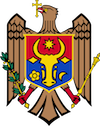Moldova /mɔːlˈdoʊvə/, officially the Republic of Moldova (Romanian: Republica Moldova pronounced [reˈpublika molˈdova]), also known as Moldavia, is a landlocked country in Eastern Europe located between Romania to its west and Ukraine to its north, east and south. Its capital city is Chișinău.
Part of Romania during the interwar period, Moldova was incorporated into the Soviet Union at the close of World War II. Although the country has been independent from the USSR since 1991, Russian forces have remained on Moldovan territory east of the Nistru River supporting the separatist region of Transnistria, composed of a Slavic majority population (mostly Ukrainians and Russians), but with a sizeable ethnic Moldovan minority.
Moldova declared itself an independent state with the same boundaries as the Moldavian Soviet Socialist Republic in 1991 as part of the dissolution of the Soviet Union. A new constitution was adopted July 29, 1994. A strip of Moldova’s internationally recognised territory on the east bank of the river Dniester has been under the de facto control of the breakaway government of Transnistria since 1990.
Moldova is a parliamentary republic with a president as head of state and a prime minister as head of government. It is a member state of the United Nations, the Council of Europe, the World Trade Organization (WTO), the Organization for Security and Cooperation in Europe (OSCE), the GUAM Organization for Democracy and Economic Development, the Commonwealth of Independent States (CIS) and the Organization of the Black Sea Economic Cooperation (BSEC). The country aspires to join the European Union.
Moldova experienced significant political uncertainty between 2009 and early 2012, holding three general elections and numerous presidential ballots in parliament, all of which failed to secure a president. Following November 2010 parliamentary elections, a reconstituted AEI-coalition consisting of three of the four original AEI parties formed a government, and in March 2012 was finally able to elect an independent as president. As of late May 2013, the ruling coalition – comprised of two of the original AEI parties and a splinter group from a third – is called the Pro-European Coalition. In November 2013, the Moldovan Government initialed an Association Agreement with the European Union (EU), advancing the coalition’s policy priority of EU integration.
